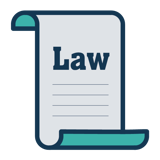The Right to Freedom of Thought, Conscience and Religion
The right to freedom of thought, conscience and religion is protected by Article 9 of the Human Rights Act.
Key information
Last updated: 09th November 2022
This right often comes up in:
Anti-discrimination, health, care & social work, LGBTQ+ rights, mental health and capacity, migration and refugee rights, privacy, data and surveillance, environmental issues and protest.
Part absolute, part non-absolute right
How might this right be relevant to my life?
This right covers religious belief, but also the right to have no religion and protection for non-religious beliefs (for example, beliefs about pacifism and vegetarianism). This right makes sure that people can manifest their beliefs when there is no justifiable reason to restrict them. This right has two different parts:
- the right to hold or change religious or other beliefs; and
- the right to put your thoughts and beliefs into action (this is called ‘manifestation’).
Can my right to be freedom of thought, conscience and religion be restricted by a public official?
Yes...and no!
The first part of this right, the right to hold or change religious or other beliefs is absolute. It recognises that people can believe what they want, but when they manifest (or practice) their beliefs they have to respect other people’s rights. This means that the right to believe and think is absolute and can never be restricted.
However…
This second part of this right is a non-absolute right which means it can be limited or restricted in certain circumstances. For example, the Government made laws limiting the number of people who could gather to worship during the Covid-19 pandemic.
But, like all other non-absolute rights, if the Government (or any public official) is going to limit the right to the freedom of thought, conscience and religion, the restriction has to be:

Lawful:
There must be a law which allows public officials to take that action or decision.

Legitimate:
There is a good reason (for example public safety or protecting the rights of other people, including your family members or staff).

Proportionate:
They have thought about other things they could do, but there is no other way to protect you or other people. It must be the least restrictive option.
You can ask the public official about their decision or action and ask them to tell you how it was lawful, legitimate and proportionate.
If you can think of a way to deal with this situation or decision that is less restrictive to you then you can raise it with the public official as the decision may not be proportionate.
What duties do public officials have?

To respect your right:
This means public officials (including the Government) should not interfere with the right to freedom of thought, conscience and religion, unless it is necessary, and they can show that this is the case. They should try to accommodate your religion or belief where possible.

To protect your right:
This means that the government and people working in public bodies should try to remain neutral and impartial, and promote mutual tolerance rather than conflict between those holding different beliefs.

To fulfil your right:
When things go wrong, regarding the right to freedom of thought, conscience and religion, there should be an investigation and steps should be taken to try and stop the same thing happening again.
J's Story
J relied on his right to freedom of thought when he was dismissed from his job after raising concerns about where the company invested its pension funds.
J's Story
J relied on his right to freedom of thought when he was dismissed from his job after raising concerns about where the company invested its pension funds.
Nadia’s Story
Nadia relied on her right to freedom of thought, conscience and religion to challenge her employer’s refusal to let her wear a crucifix at work.
Nadia’s Story
Nadia relied on her right to freedom of thought, conscience and religion to challenge her employer’s refusal to let her wear a crucifix at work.
Related information

Experience-Informed Research
Our policy work is underpinned by people’s lived experience. One of the ways we do this is through experience-informed research on key areas the impact people's lives.
Experience-Informed Research

Our policy work is underpinned by people’s lived experience. One of the ways we do this is through experience-informed research on key areas the impact people's lives.


